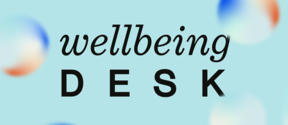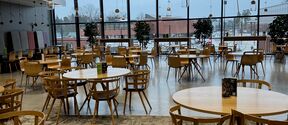Oasis of Radical Wellbeing
Social sustainability in practice.

If people were machines, we would marvel at their robust features for energy regulation, self-repair and auto-enhancement.
People do have an amazing ability to recover from the ordeals of life, though this is hard to believe when in the middle of a major loss, failure or disappointment.
People need a slowdown in the stream of events, when they can take breaks, come up for air and decompress. When they have the chance to recover.
A perfectly balanced life may be unattainable
Instead, you can aim for resiliency, or a state where your inner resources are sufficient to get you through the biggest challenges, and large enough so that the normal setbacks don’t make you veer badly off course. Resiliency can also be defined as the ability to learn from experience and grow as a result.
People can increase their own resiliency when the demands put upon them are not beyond their skills, their available support and their opportunities for recovery. If there is no let-up in the demands or they are too heavy or prolonged, the person may be overloaded to the point of exhaustion.
Take the signs of overload seriously
If you begin experiencing problems sleeping, have prolonged bouts of the flu, begin seeing everything in a gloomy or cynical light, or if it’s getting harder to get things done or you lose interest in seeing friends and being around people, then you should stop and look into the issue.
Fatigue impacts all areas of life, from studies and work to mood and sex life. It is devious in that the first ways that come to mind to relieve the situation often end up just digging the hole deeper. Sustainable solutions call for perceiving the problem and then hanging on doggedly to the chances for recovery.
Recovery is the counterforce to overload
The first factor mentioned when talking about recovery is often sleep. It is the cornerstone of physical recovery. During sleep, the body mends itself in multiple ways. Getting enough sleep also helps long-term memory and supports mental stamina and endurance.
Sleeping well is often a sign that the other elements of recovery are in order, too. Sleep isn’t everything, however.
Fatigue almost always involves physical as well as cognitive and emotional overload. Emotional load is often overlooked, even if disappointments and fears about the future occupy one’s mind night and day.
When a person’s thinking is limited by fatigue, they often get stuck in a narrow, simplistic (and often pessimistic) way of seeing things. Going over the same problem repeatedly causes even more fatigue and makes it even more difficult to see or give credit to anything that is going well.
Recovery is everything that overload is not
It is said that recovery begins once the overload ends. In reality, however, more is needed.
The first step is getting free: deciding to leave the work and the cares behind for a moment. This kind of disengagement is needed at regular intervals, for a prolonged stretch of striving after performance and achievement just makes it harder to break out of the cycle. Ideally, you should have breaks as a part your daily and weekly schedule. In the long run, no one is cut out to be a 24/7 performance machine.
Something else is needed in life: Something Completely Different – something that has nothing to do with the things you otherwise strive after.
While Something Completely Different can give you the chance to be good at something, it also gives you the chance to be honestly bad and an absolute beginner at something. Or the chance to do something where skill levels have no meaning at all.
You need human relationships also. In relationships, quality is generally more important than quantity. However, just having an ordinary chat can also have its own meaning and importance.
Contact with another helps to break out of the isolation that an overloaded person often gets into. An isolated person is also more prone to try resolving a situation by focussing on their own performance at just the time when taking a break would be the better solution.
Look at things from a different direction
People of all ages think about their own adequacy, but the issue is more concrete for students and those who are just entering working life. A person may be ready to accept a lifestyle that is unsustainable in the long run in order to be good enough or to get ahead.
It is important to learn to think about things from the standpoint of your own values. In what kinds of things do I want to invest myself? What do I want to promote in life? What kind of mark do I want to leave behind me? Pondering things from this perspective leads to the Big Question, or why taking care of your energy levels is truly important in the first place.

Social sustainability in practice.

The Wellbeing Desk and the Wellbeing Chat service-pilot has ended. There is many other wellbeing services offered at Aalto, for example Mielen Chat and Mielen Sparri (Mental Chat and Sparring) are easily accessible digital mental wellbeing support services provided by Terveystalo (occupational health care). You find more info at Aalto's Wellbeing index.



